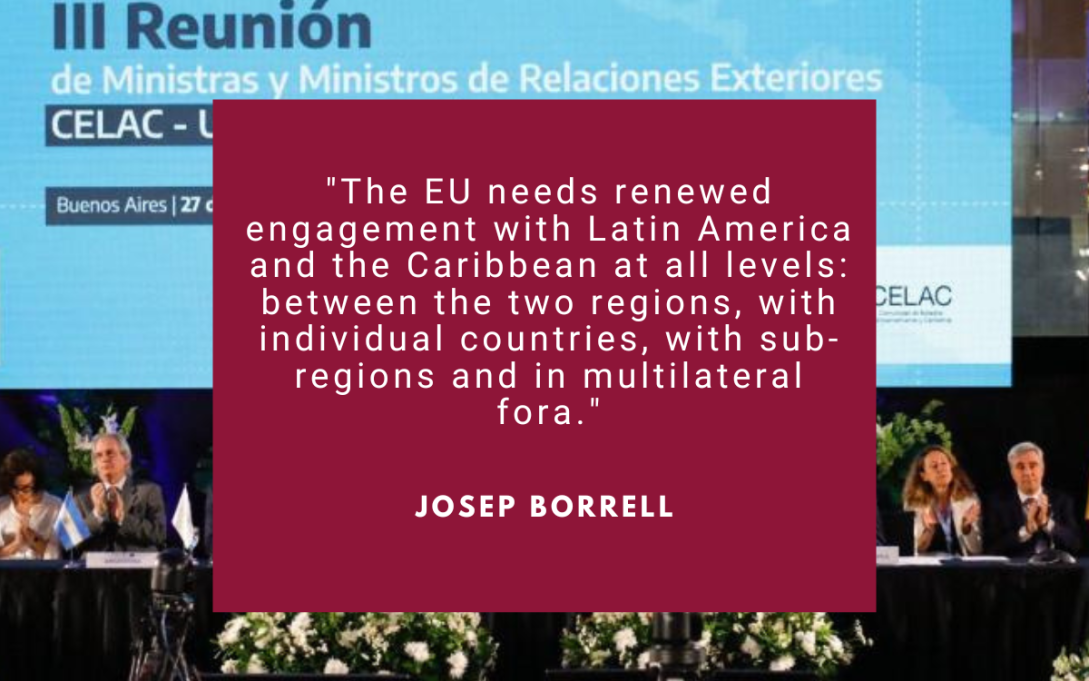A new EU agenda with Latin America and the Caribbean

Since I became HRVP in 2019, I made it part of my mission to strengthen our “other transatlantic relationship”, the one with Latin America and the Caribbean (LAC). This region has traditionally been a foreign policy priority for some of our member states, such as Spain and Portugal, who have strong historical ties, but I am determined that it become a strategic priority for the Union as a whole.
We already have a dense network of agreements with 27 out of 33 countries of the region. Our economic ties are also strong: European Foreign Direct Investment (FDI) in the LAC region is bigger than our FDI in India, China and Japan combined. Millions of people from the LAC region live in the EU and vice versa and our two regions are also closely aligned in terms of interests and values. However, in recent years, other actors, notably China, have been very active in strengthening their economic and political footprint in the region.
We cannot just rely on our traditional ties with the LAC region
We need to speed up and cannot just rely on our traditional ties. This was already true before Russia's war of aggression against Ukraine, but it is all the more true today when the quality of our bilateral relations with the so-called “Global South” has become so crucial for our future and the future of the rules-based world order.
Paying more attention to the region also makes a lot of sense at a time when we are seeking to diversify our value chains and reduce our excessive dependencies, by working with reliable partners. Latin America and the Caribbean are central in the fight against climate change and represent a global power in terms of biodiversity, renewable energies and strategic raw materials for the green transition. However, the region does not want to return to the past. It wants to take advantage of these transitions to industrialise and add value to its exports.
Latin America and the Caribbean are central in the fight against climate change and represent a global power in terms of biodiversity, renewable energies and strategic raw materials for the green transition.
Since 2019, I have invested quite a lot of energy to strengthen our ties with the region. I have travelled to Argentina, Brazil, Chile, Colombia, Cuba, the Dominican Republic, Panama, Peru and Uruguay, to promote closer relations and stronger collaboration. Last October, I co-chaired the first CELAC-EU ministerial meeting since 2018 in Buenos Aires. We are now in the final stage of preparations for the EU-CELAC summit that will take place on 17 and 18 July in Brussels, the first since 2015 and a major milestone to set a common agenda.
It is in that context that last Wednesday I presented with the Commission a New Agenda for Relations between the EU and Latin America and the Caribbean. We want to open a new era of cooperation in today’s fast-changing global context. To achieve this goal, we need renewed political engagement at all levels: between the two regions, with individual LAC countries, with sub-regions and in multilateral fora. We also need a more structured relationship, with regular summits and a permanent coordination mechanism between the EU and CELAC to ensure continuity and follow-up. Regular high-level political dialogue is indeed key to provide focus, agree on priorities and joint actions and to address differences if they arise.
Moving from “natural partners” to “partners of choice”
We propose to move from being “natural partners” to being “partners of choice”. Being “partners of choice” is about political will: the will to work together to address global challenges and strengthen the rules-based order - with the ultimate goal of promoting peace, security and democracy. The upcoming EU-CELAC Summit offers a great opportunity to build trust and inject momentum into our relationship. Reinvigorating the EU-LAC relationships will be one of the key achievements of this geopolitical Commission.
MORE FROM THE BLOG

“A Window on the World” – by HR/VP Josep Borrell
Blog by Josep Borrell on his activities and European foreign policy. You can also find here interviews, op-eds, selected speeches and videos.
